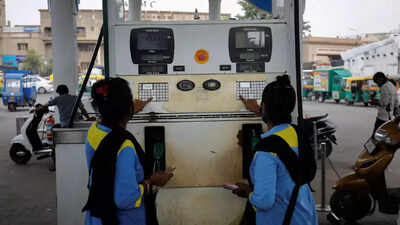
New Delhi: The government on Friday cracked down on private fuel retailers by bringing everyone in! Petrol pump Fuel retail license holders under USO (Universal Service Obligation) to prevent deliberate closure or starvation of stock outlets to reduce losses on petrol and diesel.
But private companies have found a solution to charge Rs 2-5 per liter more than the artificially low rates of state-run retailers to give pricing freedom and discourage sales.
The government’s move comes amid reports of state-run retailers’ petrol pumps drying up in several states after rumors of shortages due to shutdowns or cuts by private companies due to a sudden buying spree.
Under USO, Licensed Entities retail fuel Supply of petrol and diesel on demand to all customers without any discrimination during specified working hours. They will have to maintain minimum inventory levels specified by the Center and ensure availability of fuel at reasonable prices to the customers.
For months now private players have been reducing stocks at outlets and many of them were closed in the recent past to avoid losses resulting from freeze on pump prices by government retailers, which is 90% serve the market, while crude is hovering around $120. per barrel.
At current pump prices, which correspond to around $85 a barrel of crude, the under-recovery is expected to rise to Rs 18-19 on a liter of petrol and Rs 20-21 on diesel. With such sustained level of losses, private players raised the price of petrol by Rs 2-3 per liter and diesel by Rs 3-5 to discourage sales.
Cuts by private players shifted their retail and wholesale consumers to state-run outlets and affected the latter’s supply logistics, leading to delays in replenishment of stocks – particularly away from supply points. The problem was notable in Rajasthan, Maharashtra and Karnataka where there is a substantial presence of private players.
State-run retailers have extended working hours and introduced night shifts at their depots and terminals to increase the number of tankers. Additional fuel inventories are being allocated for the affected areas to meet the additional demand.
June is generally a high demand period due to increased farming activities. A strong post-Covid rebound in economic activity and the summer holiday season pushed up fuel consumption by nearly 50% in the first fortnight compared to a year ago. Recent power shortages also contributed to demand as more generators were used. The shift of consumers served by private petrol pumps created a run on stocks at the outlets of public sector companies.
FacebookTwitterinstagramKu APPyoutube